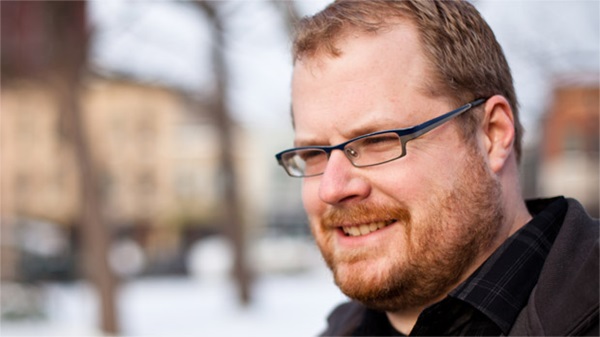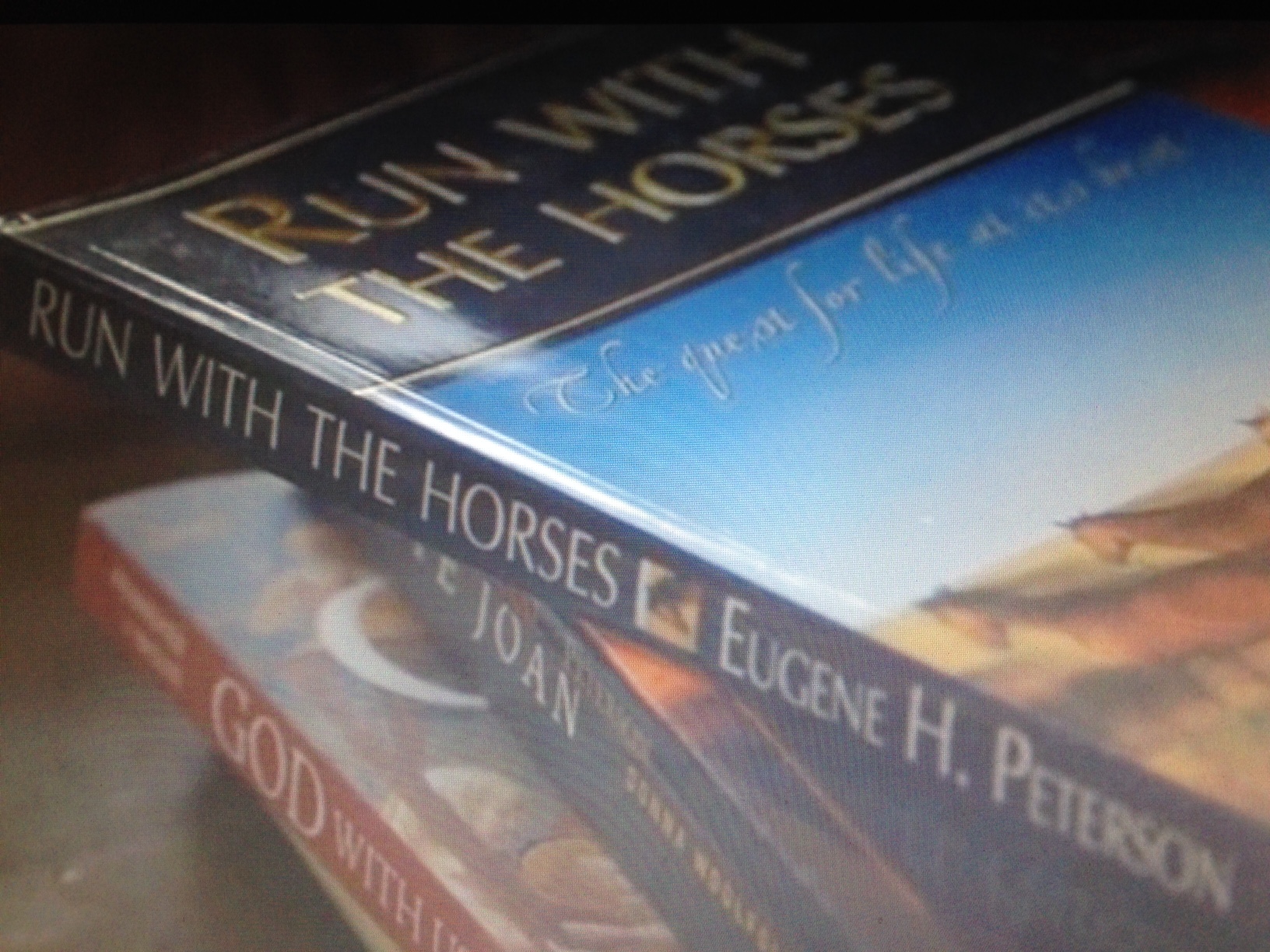 Photo Credit: Christianity Today
Photo Credit: Christianity Today
Nathan Clarke is a filmmaker with Fourth Line Films. He is known for his documentaries and honest story-telling through film (see Wrestling for Jesus). Most recently, Nathan and team at Fourth Line, premiered a lovely and moving film. Produced through support of Fuller Seminary, this 20-minute documentary, Bono and Eugene Peterson – The Psalms, is available to watch on YouTube.
I had the privilege of attending a preview screening of this film (reviewed it on this blog). After the showing of the film, Corey Widmer facilitated a Q & A with Nathan Clarke and the audience. What follows is taken from my notes on the Q & A and reflects some of his thinking on the arts (how faith might color them and the cry for authenticity). Here are my takeaways.
On hoped-for impact of the film – “A lot of people who would only know Bono will now know Eugene and The Message. Those who only knew Peterson from the Message will now be introduced to his other books.” [The Message is a version of the Bible translated into the contemporary English language (of 1993) by Eugene Peterson. Although it’s over 20 years old, it still makes for an easier read for anyone new to the Bible. Peterson’s bold action for that very purpose has come under criticism over the years, with some calling The Message a paraphrase, not a true translation. For Bono, this version made Scripture come alive for him.]
Sidebar: I didn’t know Peterson wrote other books until watching this film. Bono praises Peterson’s book Run with the Horses as “a powerful manual for me”. Besides The Message, there are over 30 books available to us written by Eugene Peterson. Photo Credit: YouTube – Bono & Eugene Peterson
Photo Credit: YouTube – Bono & Eugene Peterson
This revelation reminded me of a tiny section of my bookcase, right beside my work desk, that houses the best of my “old friends”. Oswald Chambers’ classic My Utmost for His Highest is only one of several great wisdom books under his authorship. Thanks to Nathan Clarke, I will look into Eugene Peterson’s other books.
On making art as a Christian – Nathan told the story of making the film Wrestling for Jesus. As he filmed this documentary about Christian wrestlers, one of them, in the course of the filming, began to have his life fall completely apart. Was his “wrestling for Jesus” over? Nathan and team incorporated that story in the film. When he submitted the film to a Christian film festival, it was rejected because it wasn’t “family-friendly”. “What about David? What about Solomon?”, Nathan lamented. [The Bible is full of messy real-life struggles. Do we just white-wash those? In the film with Eugene, Bono sees Christian song-writers as being “vulnerable, open, porous toward God”; he implores them to “write honest lyrics” – about your bad marriage and…about how frustrated you are with your government. I’m suspicious of Christians because of this lack of realism in art, in life, and in music.”]
On art and the church – Nathan went on to ask the question, “Do we think of artists as just accentuating the decoration of the church?” [echoing Bono’s declaration on the arts as “essential not decorative”] Nathan then implored, “All my work is out there – is there a place for it in here [the church building/the church itself]?” When asked how we can create Christian communities where artists could thrive and create, Nathan offered some practical suggestions:
- Patronage – We should buy their work.
- Offer effective and helpful critique of art – in a way that honors the image of God in who they are and still say, when necessary, “That sucks”. […this coming only out of a place of honoring…emphasizing this, as a mom of an artist.]
- Business people can help artists with the business side of their work. Helping them learn from failures and from success; helping them to market themselves, run a business, do taxes. This is also a form of patronage.
- Give space for artists to talk about their art, practice their art, display their art in this place (the church building). [There are just a limited number of paid positions within a church (ex. worship leader). Still, there are artists in our churches that could have a place to express the gifts God has given them…these songwriters, musicians, writers, painters, and poets.]
This was so helpful, Nathan. Thank you!
On authenticity as artists who are also Christians – “If you look at God as artist, he didn’t make art a utilitarian thing (a means to an end). He expressed art as an end in itself”. Nathan talked about how affected he was by the film In Pursuit of Silence. He quoted Greg Hindy, a student/pilgrim, in the film: Photo Credit: New York Post
Photo Credit: New York Post
“Silence should be explored not explained”. Then Nathan applied that to art as being best “explored not explained”. Art is better served not with the end in mind but through illumination that comes in the making of the art (as he discovered in the filming of Wrestling For Jesus). Even as Christian artists try to explain what part God played in their work, how can we really know or compartmentalize that? [As much as we would hope art could have an impact on our culture, for instance, can we shape or manipulate the art toward “making that happen”? Is that right/honest/authentic?] Nathan responded with “Art that seeks to catalyze will never affect change, but good art catalyzes change.” He talked more about the role of the artist who is also Christian as a “faithful presence” (from James Hunter’s book To Change the World) – honoring God through his craft and serving others with it. Photo Credit: AZ Quotes
Photo Credit: AZ Quotes
Christian artists, like others, walk a fine line here, and Nathan stated he felt that tension all the time. Filmmakers manipulate light, color, mood, materials, sequence… He aims to be as authentic as possible in the process – “We lie so we can tell the truth”.
__________________________________________________________________________
I would have kept the Q & A going even longer because of all that was stirring in my heart and mind. It was exhilarating both to see the film and to hear the process of it coming to fruition in the words of the filmmaker. I wish they had filmed the Q & A honestly (or maybe they did…who knows?). Anyway, there was one other question that struck me, given my son is a musician. Nathan was asked the difference in the craft – film vs. music. With film, he says there is a wrap. You may spend hours filming, weeks and months in production and then editing, but then it’s done. With musicians, they must get tired of singing those songs forever (I wonder, Bono…do you?) Still, says Nathan, “the filmmaker, poet, and painter all want to be rock stars.” That immediate feedback. After 15 months of working on this film, this evening, this screening, was the first time he experienced that feedback “hearing people laugh at the same time” at the funny parts.
With all the arts, there is a cost…but there is so much gain…for all of us.
Thanks again, Nathan, and Fourth Line Films.
Art and the Bible Quotes – Francis A. Schaeffer
In Pursuit of Silence – a Quiet Movie with Much to Say by Carl McColman
Faithful Presence – an Interview with James Davison Hunter by Christopher Benson
